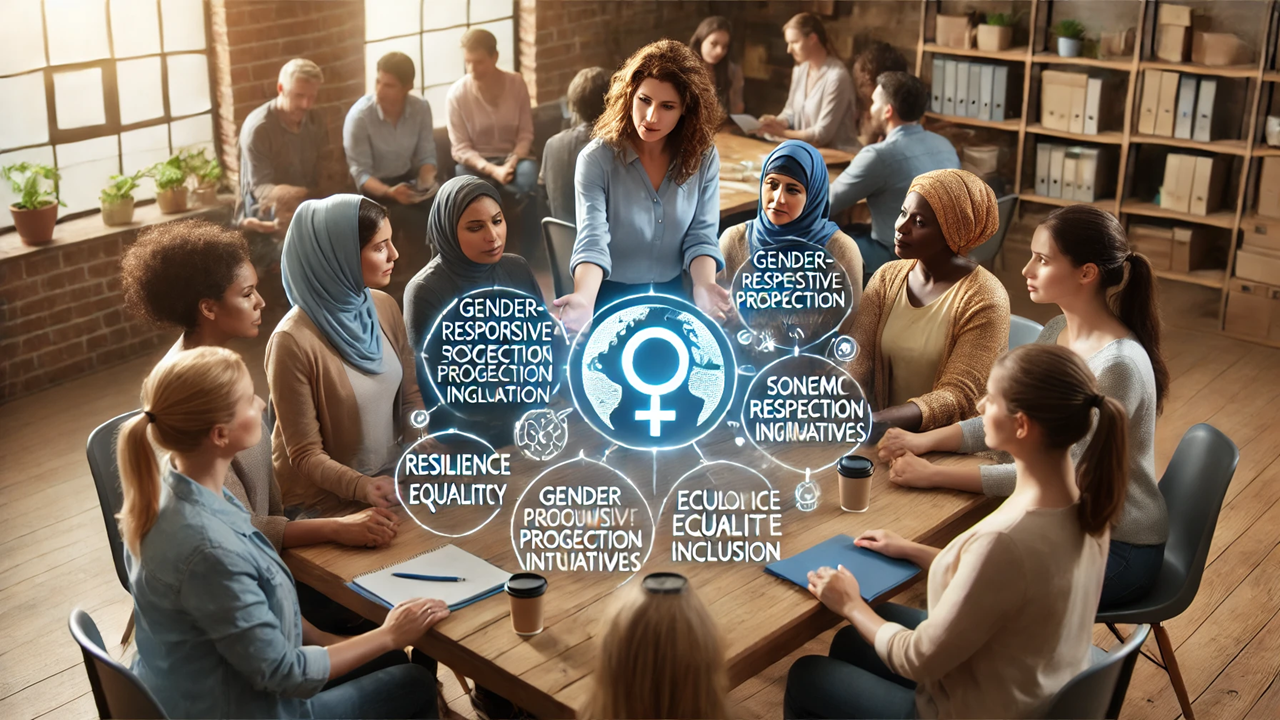Advancing Gender Equality Through Social Protection: World Bank's New Strategy
The World Bank's report, "Accelerating Gender Equality Through Social Protection," unveils a comprehensive strategy to foster gender equality through targeted social protection measures. Focusing on expanding economic inclusion, building resilience, and promoting partnerships with the private sector, the report emphasizes strategies for improving women’s access to social safety nets, tackling gender-based violence, and supporting sustainable economic empowerment.

In a sweeping effort to address the root causes of gender inequality, the World Bank’s recent report, "Accelerating Gender Equality Through Social Protection," lays out a bold framework for leveraging social protection programs to enhance the lives of women and girls worldwide. From economic inclusion initiatives to adaptive safety nets in crises, the report stresses that social protection systems have a vital role in reshaping opportunities, protecting against risks, and supporting gender equity.
The Unique Role of Social Protection
Social protection programs—ranging from cash transfers and public works to economic inclusion initiatives—are proving essential in tackling poverty, reducing inequality, and specifically empowering women. The World Bank’s findings reveal that these programs enhance access to jobs, financial stability, leadership opportunities, and educational resources for women, all of which are foundational to gender equality. However, challenges persist: globally, nearly half of the population lacks adequate social protection coverage, with women disproportionately affected due to factors like informal employment, caregiving responsibilities, and gender pay disparities.
Key Approaches and Evidence: Targeting Root Causes of Inequality
Empowering Women through Cash-Plus Programs
The report spotlights the effectiveness of "cash-plus" models, which combine financial assistance with complementary services like skills training, healthcare access, and community support networks. Such programs not only provide immediate economic relief but also encourage longer-term changes in behavior and social norms. By addressing gender-based violence (GBV) and fostering economic independence, cash-plus approaches lay a strong foundation for women’s empowerment.
Boosting Economic Inclusion in Vulnerable Regions
Economic inclusion programs, particularly in fragile and conflict-affected areas, show significant promise in uplifting women from poverty. By combining financial support with skill-building, access to markets, and digital financial services, these initiatives empower women to enter and thrive in the labor market. The World Bank emphasizes the importance of directing these programs toward informal sector workers, who often lack conventional safety nets but represent a substantial portion of the female workforce.
Building Resilience in Crisis Settings
In an era of climate change and geopolitical instability, resilience is crucial. Adaptive social protection systems are tailored to support women in crisis settings—whether through digital payment options, climate-resilient training, or safe access to income-generating activities. These resilience-building measures are particularly critical for women and girls in regions facing ongoing crises, as they provide both financial security and pathways for economic recovery.
Addressing Structural Challenges
While social protection systems have demonstrated transformative potential, the report also identifies barriers that continue to hinder gender equality.
Coverage Gaps: Women face gaps in social protection due to systemic inequalities, such as lower rates of formal employment and disproportionate caregiving duties. Expanding gender-smart social protection is necessary to bridge these gaps.
Data Deficits: Reliable, sex-disaggregated data is essential for designing gender-responsive programs. The World Bank calls for enhanced data collection methods to accurately assess and address gender disparities in social protection access and benefits.
Recommendations for Scaling Gender-Sensitive Social Protection
To maximize the impact of social protection on gender equality, the World Bank report offers targeted recommendations,
Expand Gender-Smart Coverage
Closing the coverage gap requires a concerted effort to develop programs that address the unique needs of women in informal sectors. This approach is key to addressing income disparities and caregiving burdens that disproportionately affect women.
Integrate Cash-Plus Models for Comprehensive Support
Cash-plus programs, which combine financial support with essential services, are recommended to address societal challenges such as GBV, health, and gender norms. Community-based support is highlighted as an effective way to promote behavioral change and foster a culture of gender equality.
Enhance Access to Care Services
Social protection can support the development of the care economy by providing job opportunities and reducing caregiving burdens on women. This not only aids women’s workforce participation but also promotes economic growth and gender equity.
Forge Partnerships with the Private Sector
Collaboration with the private sector is essential for driving systemic changes. From equitable pay policies to parental leave, private companies can play a crucial role in creating more inclusive workplaces, and amplifying the reach and impact of social protection initiatives.
Prioritize Data Collection and Analysis
Robust data collection is needed to measure program impact accurately and develop tailored solutions. Collecting sex-disaggregated data is especially critical in understanding and addressing the gender-specific needs of women in migration, FCV (fragility, conflict, and violence), and climate-affected areas.
Looking Ahead: A Vision for Inclusive Social Protection
The World Bank’s report, "Accelerating Gender Equality Through Social Protection," provides a compelling roadmap for governments, development agencies, and the private sector. By expanding social protection coverage, empowering women economically, and investing in adaptive systems, these efforts promise a more inclusive, equitable world. With a focus on resilience, economic empowerment, and transformative social norms, the World Bank’s vision is clear: to create an environment where women and vulnerable communities can thrive, participate fully, and contribute meaningfully to society.
As nations work to recover from global crises and address entrenched inequalities, the insights from this report offer a timely guide to building a more resilient, inclusive future through targeted social protection efforts.
- FIRST PUBLISHED IN:
- Devdiscourse
ALSO READ
One in three women experiences gender-based violence
NDPP Advocate Batohi Calls for Community Action to Combat Gender-Based Violence
Steve Letsike Calls for Urgent Action to Combat Gender-Based Violence in SA
EIB Provides €60M Green Loan to ILUNION for Energy Efficiency and Social Inclusion in Spain
Merck Foundation Leads the Charge Against Gender-Based Violence Through Empowerment Initiatives










